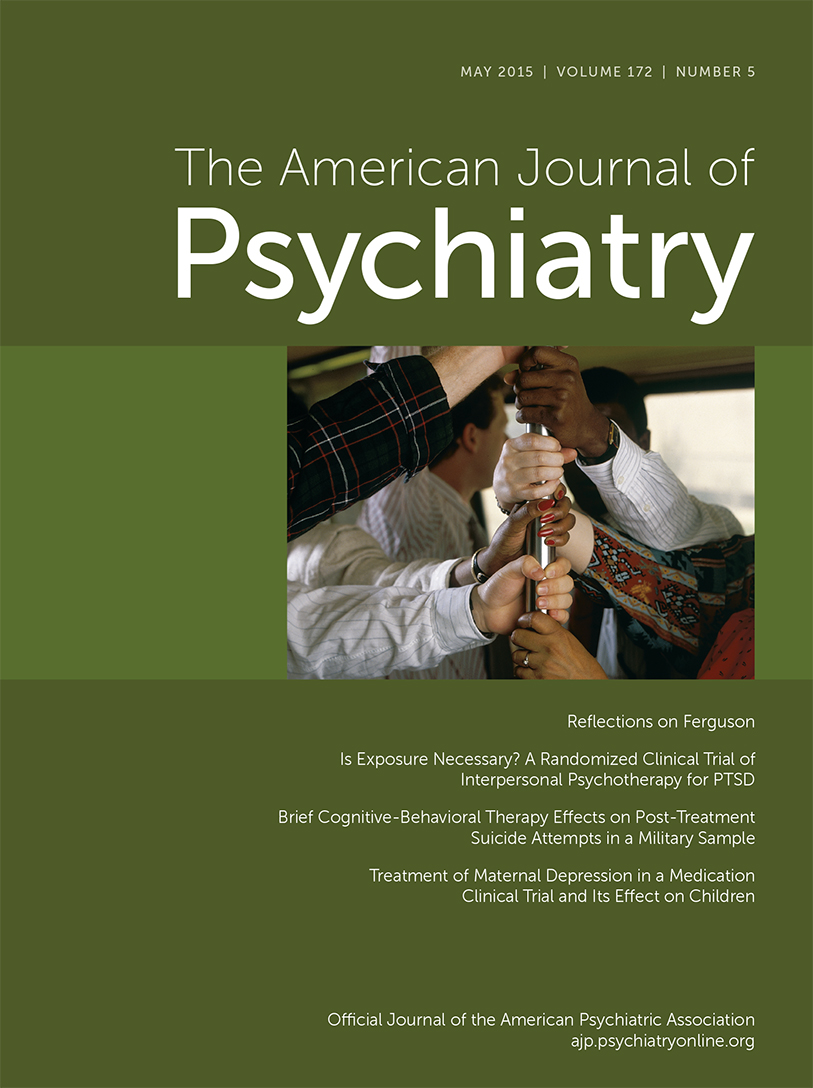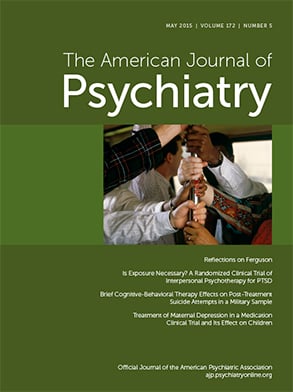The article by Weissman and colleagues in this issue (
1) continues a valuable line of research by Weissman’s team on the effects on children of treating maternal depression. Parental depression affects multiple aspects of the child-rearing environment, including parents’ ability to meet children’s basic needs, provide warm, consistent parenting, and model adaptive strategies for coping with stress (
2). The salience of these multiple risk factors is evident in the extensive research documenting increased rates of psychopathology and behavioral, academic, and health problems among children of depressed parents across the globe (
3–
5). As with this group’s earlier publications (
6), this study highlights the complexity of interpreting the benefit of mothers’ medication treatment alone on children’s short-term outcomes. While mothers’ depression symptoms improved regardless of which of three medication regimens they received (escitalopram, bupropion, or the combination of the two), benefits for children were unexpectedly only apparent among mothers treated with escitalopram.
This study is notable for its multiple sites and a larger sample size than previously used; data collected by multiple informants; thorough analytic strategies; and, especially, examination of a variety of potential mediators of associations between maternal depression and child outcomes. One of the most intriguing findings of the study is the suggestion that associations between maternal and child improvement may be mediated by changes in parenting behaviors. However, the lack of a placebo group or a psychotherapy comparison group, as well as the brief follow-up period, are obvious limitations, as noted by the authors. Twelve weeks is very brief relative to the duration of the children’s exposure to their mothers’ depression and the development of their own symptoms and disorders. Furthermore, the lack of clear a priori hypotheses regarding the observed differences among the medication treatment groups reduces the viability of the suggestion that escitalopram monotherapy may be a preferred choice for mothers with the anxious or irritable symptom profile. There is not yet sufficient evidence to support tailoring treatment according to the parent’s clinical presentation, comorbid conditions, or ages of children.
An important methodological issue is that it is not clear that the study of these mothers represents a randomized trial. Between-group differences in mothers’ age and marital status suggest that the initial randomization of mothers into treatment groups was not comparably maintained once the women who were mothers of children in the target age range “entered” the child outcomes study. This is a common threat in such two-stage designs, and it is important to note that simply controlling for the measured, known differences between groups does not necessarily adjust for all the true differences. For example, the lack of an effect of combination treatment, in which mothers were significantly older, may be due to the length of time that the children have been exposed to maternal depression rather than to some combined effect of the two medications.
Although access to depression treatment has improved, most adults do not receive guideline-concordant care (
7,
8). The majority of mothers in this and other such trials have had multiple untreated depressive episodes, and their children have had years of exposure to parental depression and its consequences. Medication for mothers alone, even when it reduces depression symptoms, is unlikely to have a sustained and meaningful effect on children’s outcomes (
9). Weissman and colleagues’ study highlights this point, given that in two of the three groups, children’s outcomes did not improve despite reductions in the mothers’ symptoms. All this is not to dispute that the children of mothers who improved are likely to be much better off than if their mothers had remained depressed. Hopefully, this excellent research group will be able to evaluate the children’s outcomes over a longer follow-up period, both during the maintenance phase of pharmacotherapy and after treatment is discontinued.
Effective interventions for depressed parents and their children must demonstrate both statistically and clinically significant change in relevant functional outcomes. In the sample for this study, although effect sizes for children’s depression symptoms and functional impairment were moderate (more than 0.5 standard deviations), mean scores even at baseline were below typical clinical cutoffs, which suggests that this sample of children was not particularly distressed even before the mothers started treatment. Interventions for families in which both parents and children meet diagnostic criteria for depression or other disorders may produce valuable information about effective treatments and key mediators of effects.
Ultimately, a public health perspective that incorporates screening, prevention, and treatment of both parents and children is likely to be most effective in reducing the burden of parental depression (
10). Interventions must offer a range of services and be flexible enough to identify which families require parenting support, medication, psychotherapy, home- or school-based services, and social services. Finally, efforts to reduce the stigma of mental illness are essential to increase early utilization of services, before parents’ depression affects children’s long-term well-being.

